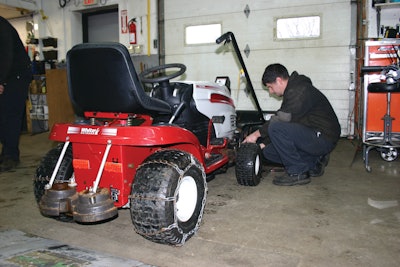
In a 2013 survey of Green Industry Pros equipment dealer readers, we uncovered some of the critical issues impacting the independent outdoor power equipment retail and service industry. These issues continue to put pressure on dealers and threaten the success of their businesses.
The five top-ranked issues impacting dealers include:
- Small profit margins
- Maintaining a knowledgeable staff
- Online retail competition
- Economy and weather
- Service department productivity
Many of these challenges are wearing dealers thin. As they look for ways to make up in one area, they are often falling behind in another or giving even more of themselves. “We are in the sixth year of a bad economy with no real improvement in sight, and equity reserves long gone. No small business has enough cash reserve to last this long. You can stash enough away to get you through a short downturn but not for years on end. To survive, we have cut expenses radically and I'm working way too many hours,” a surveyed dealer shares.
While the economy and weather are out of dealers’ hands, the rest of these top issues are things dealers can address in the way they operate their businesses. Below, dealers share their concerns as we offer solutions that may be suitable for your business.
Small Profit Margins
The number one thing on dealers’ minds continues to be their shrinking profit margins. Increased overhead and online retailers are a few things driving down margins. One dealer even lamented that the margins are keeping him from selling his business to a next-generation owner.
“OEMs not raising prices for the last 30 years is causing independent outdoor power equipment dealers who focus on wholegoods to go out of business. I’m looking to soon transfer my business to a younger individual, but no young person could possibly be interested in an industry that refuses to raise prices and offer margins that can sustain a profitable business. OEMs need to start increasing prices so the industry can survive."
Avoid inventory overload
Dealers can’t control a lot of the things that put pressure on their margins (i.e. increased health care costs) but there are things they can do to reduce their own costs, maintain margins and foster stability. Dean Davis of Dogwood Fire and Lawn in Carbondale, IL, has focused on investing less in inventory at the start of the season to keep from paying interest on an overstocked and undersold floor plan.
“We as dealers have read for years that we need to manage inventory more closely,” says Davis. “The new method is simple: No bulk spring orders. If a part is not selling at least four times per year, or a machine two times, you can't afford to stock it. We quit trying to have everything in stock. When you pay more in interest than you take home, it's time to wake up.”
Smart staffing
Davis has also cut back his staff hours. Many dealers already practice this in the offseason, but it should also be considered yearlong when feasible.
“You don't need a full staff every hour of every day,” explains Davis, who says long-time staff should understand the change in hours. “Good, loyal staff knows that if they are just standing around because there is little work to be done, it will drag the whole operation down. Thirty hours per week is better than the 40 you used to work before your employer went out of business.”
As dealers face increased health care costs, one dealer has actually turned to a staffing agency to avoid paying the expense.
“With the new mandates approaching and uncertain costs of having a labor force, we are reducing our liabilities by using companies like manpower to hire all new employees instead of hiring ourselves. Until we can get a handle on what all these extra fees, penalties, tax increases, etc. will be, we will continue to have an internal hiring freeze.”
Maintaining Knowledgeable Staff
Another issue dealers deemed critical is maintaining a knowledgeable staff. Choosing to staff your business through a staffing agency may get good candidates in the door, but hiring them on and investing in their career with your business is what will keep them there.
“For our dealers I think two things affect their ability to attract and retain employees,” says Adam Hanks, sales and technical manager at STIHL Southwest Inc. “The first is training. Training can be a benefit to their customers because it makes their employees more knowledgeable and creates a point of differentiation from their competitors. The employee benefits from training by gaining knowledge that they can then apply to other areas of the business or their life. The knowledge they gain travels with them no matter where their career path takes them.”
Training
Training should be done across the board in all departments. Each part of the dealership plays a critical role in the business’ success. The same goes for the staff in each of those departments. Make training available and encourage staff to take advantage. When training is obtained, display certification in the dealership to illustrate how much it is valued.
“Make training a priority for your staff by providing both an incentive plan and time to complete the training programs offered by your suppliers,” says Susan Brittain, president of STIHL Southwest Inc. “Although quality technical service is important, knowledgeable sales assistance is also critical. Your selling staff should be up-to-date on the features and benefits of each product you sell, and they should be trained in basic selling skills so that they can effectively communicate their expertise to your customers.”
Compensation
The second thing Hanks suggests dealers focus on to keep a strong, knowledgeable staff is employee compensation. Any time an employee shows they are taking the next step in self-improvement, consider their worth as an employee. You should also implement commission structures and bonus plans to further encourage employee performance and keep them vested in the business’ success.
“Recognizing employees who have additional training and additional skills is a must for employers,” says Hanks. “We expect our employees to perform to a certain level, and when they are capable of moving up and taking on additional responsibility their compensation needs to change accordingly.”
Online Retail Competition
Internet retailers have been squeezing out small business for years. Independent dealers are starting to feel the pressures of the online marketplace—especially in their parts departments.
“Online parts has hurt brick-and-mortar store margins. The standard 35-40% MSRP for parts is not enough to cover obsolescence, errors, returns, shipping and other costs,” one dealer explains.
It’s tough to compete in the market competitively unless you are handling a large online inventory. Margins aside, some online retailers currently have the benefit of selling parts without charging tax.
“The most unfair part of internet sales is the sales tax issue. Sales tax should be charged on all sales the same as the brick-and-mortar store.”
The Marketplace Fairness Act of 2013 has granted states the authority to require retailers to charge a tax just like the brick-and-mortars. States are only allowed to require these taxes to be paid upon simplifying state sales tax laws to make multi-state sales tax collection easy. Sales tax is due to be paid in 45 states, but can only be enforced by the 24 states with simplified laws. (Visit marketplacefairness.org for more information.) While the Marketplace Fairness Act could help dealers some, dealers must do more to compete.
“One excellent way for dealers to compete with online retailers is by offering personal, expert service before and after the sale,” says Brittain. “Unlike an online retailer, you can and should be the local expert for your customers.”
Be prepared to educate the customer on the right equipment for the specific grasses in your area, as well as when certain plants should be maintained and with what tools. Take the time to point out safety features and recommend appropriate safety apparel and equipment.
“Make sure your staff knows your products, knows your market and knows how to meet the specific needs of your local customers,” Brittain urges. “That’s something no online store can do as well as a good, local dealer.”
And if you can’t beat 'em, join 'em. More and more dealers are choosing to enter the online marketplace. Assess whether you have the means to stock the inventory and fulfill orders, and consider adding online parts sales to your business plan. At the very least, you should have a website with Search Engine Optimization (SEO) that brings you up in google searches for the products and brands you offer. If a potential customer in your area finds you at the top of their internet search, and is clued into your proximity, they may choose an in-store visit over paying shipping charges.
Read our “Online Retail in Detail” series for more information on the online marketplace and how to compete: greenindustrypros.com/11148500.
Service Department Productivity
To make up for the lower profit margins on wholegoods, dealers are pushing to increase the productivity and billable hours in their service departments. “I’m going to focus on refining my service process first and foremost, since that is the biggest part of my business and has the potential for being the most profitable,” shares one dealer.
Much of productivity in the shop has to do with having quality technicians on staff. But without streamlined processes that reduce wasted motion and effort, it doesn’t matter who is at the bench. Spend time in the service department assessing processes as they are, and look for areas that leave room for improvement.
For instance, if your top technician is walking across the dealership to get parts, you might want to put an employee who is not billing hours in the role of delivering parts to the lead techs. Many business management systems allows technicians to order parts from in the shop to be pulled from the parts department and delivered directly to them. The BMS should also be able to do things like track repair orders, assign technicians to jobs, clock technician time on a repair, and designate priority repairs—all to help increase profitability.
Outfitting the shop with the right tools (lifts, chain sharpeners, air tools, power washers, etc.) will help boost productivity and morale. Nothing is more morale-busting than being asked to do a better job with the same old tools. Another way to increase productivity is by adding comfort. Be sure technicians have a clean, well-lit and temperature-controlled environment to work in.
Warranty work that doesn’t pay
Dealers are also feeling the squeeze brought on by equipment warranty work. “Manufacturer warranty programs do not support the dealer. They are getting increasingly particular about warranty issues, and their flat rate is all to their advantage,” says one dealer. “Techs do not like warranty jobs when on commission.”
Giving warranty customers the same quality service as paying service department customers can cause a big hit to your billable hours. Avoid eating unnecessary costs by charging customers for all things not covered on the warranty. For example, if you normally offer free pickup and delivery, be sure the warranty customer is billed.
While performing warranty work may not be a real profitable action for you shop, it could turn into a profitable future for you dealership—depending on how it is handled. It has been said a million times, "customer service goes a long way." Show the warranty customer you can take care of them and their equipment, and they will likely return for more-profitable service work in the future.

![Doosan Bobcat Wacker Neuson Stack 2ec Js Pb V6e[1]](https://img.greenindustrypros.com/mindful/acbm/workspaces/default/uploads/2025/12/doosan-bobcat-wacker-neuson-stack2ecjspbv6e1.CPyyz8ubHn.png?auto=format%2Ccompress&bg=fff&fill-color=fff&fit=fill&h=100&q=70&w=100)


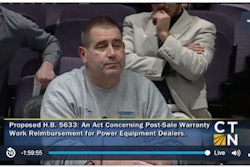
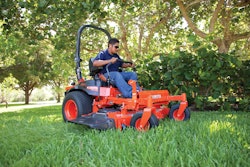
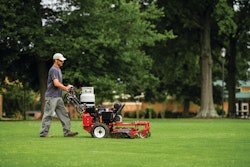
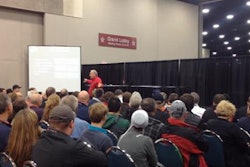


![Doosan Bobcat Wacker Neuson Stack 2ec Js Pb V6e[1]](https://img.greenindustrypros.com/mindful/acbm/workspaces/default/uploads/2025/12/doosan-bobcat-wacker-neuson-stack2ecjspbv6e1.CPyyz8ubHn.png?ar=16%3A9&auto=format%2Ccompress&bg=fff&fill-color=fff&fit=fill&h=135&q=70&w=240)








